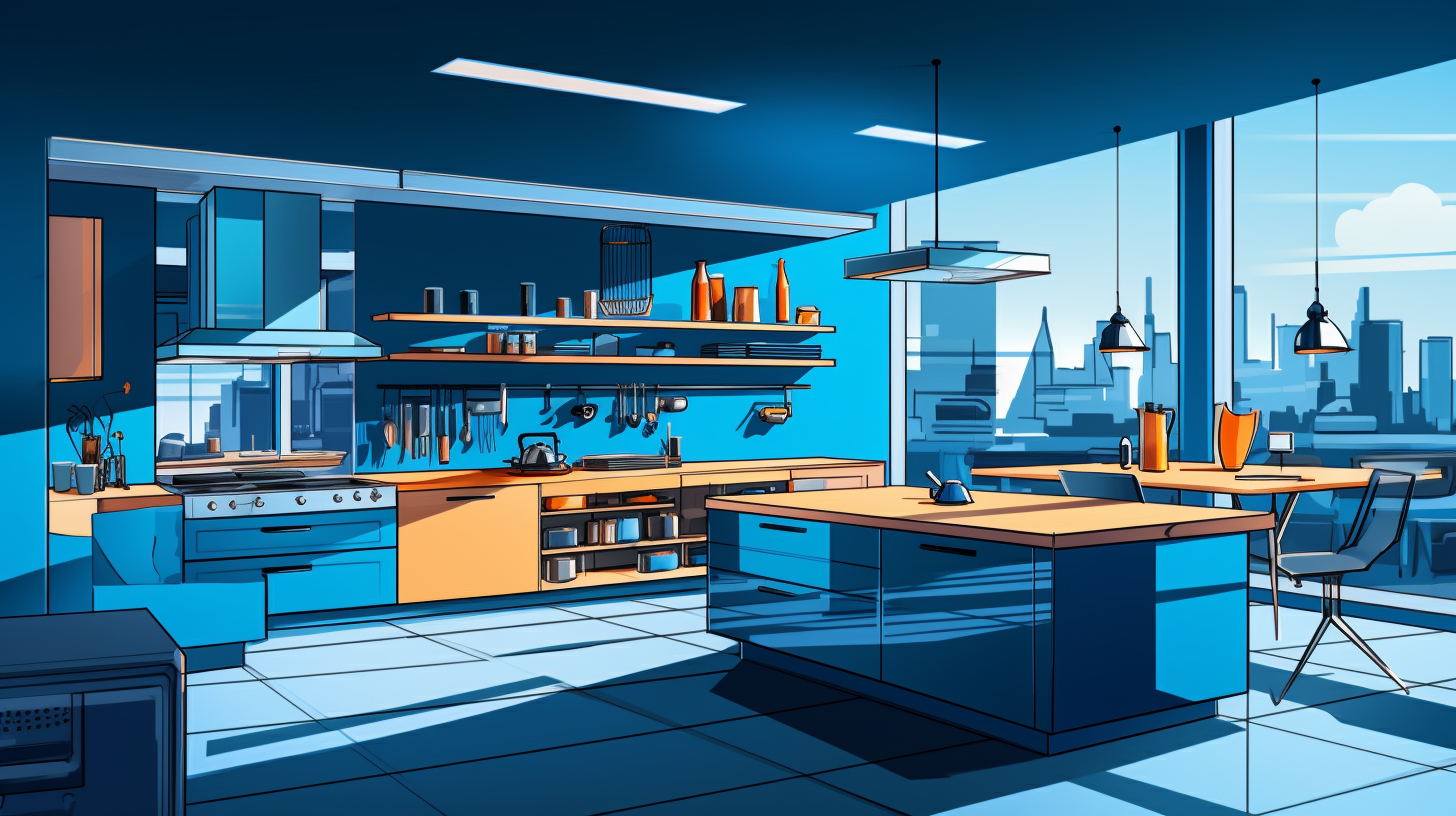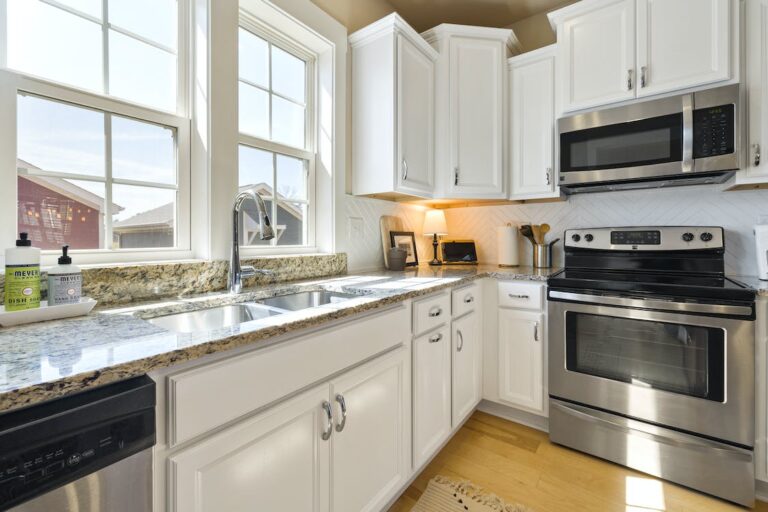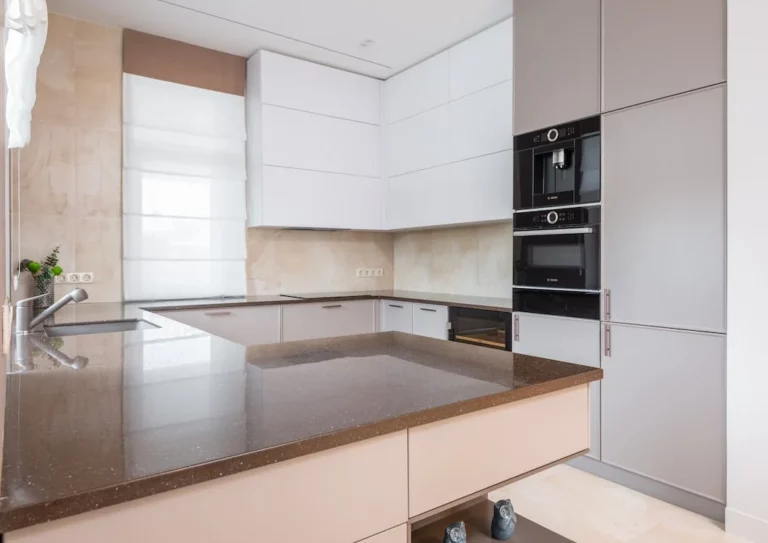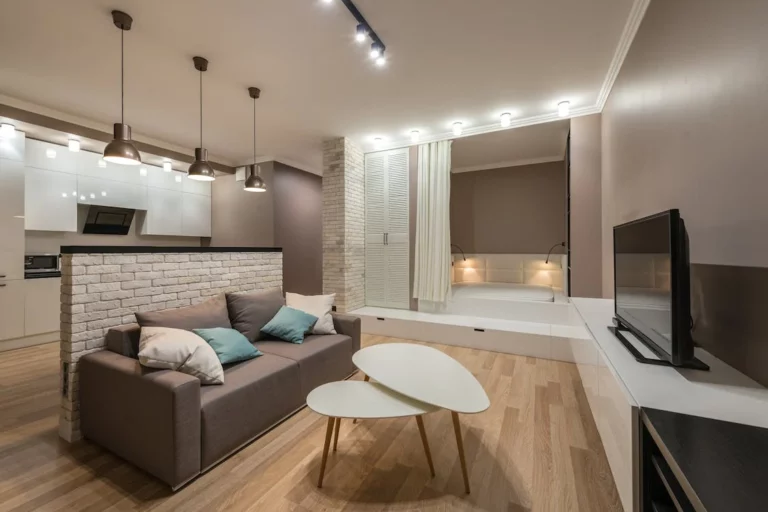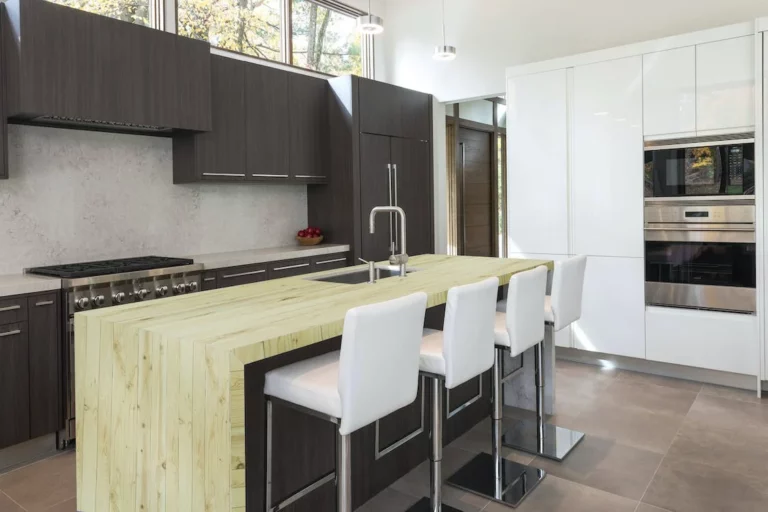Tips for a Successful Kitchen Renovation: Revamp Your Kitchen in 2023
Hey there! Are you ready to give your kitchen a fresh new look? A kitchen renovation is an exciting project that can transform the heart of your home into a stylish and functional space. Whether you’re looking to upgrade outdated appliances, improve storage, or simply create a more inviting atmosphere, a kitchen revamp can make a world of difference. But before you dive in, it’s essential to have a plan in place to ensure a successful renovation. That’s where I come in!
In this article, I’ll share with you some valuable tips and advice to help you navigate the renovation process with ease. From assessing your needs and setting a budget to selecting high-quality materials and hiring reliable professionals, I’ll cover all the essential steps to revamp your kitchen. We’ll even discuss the finishing touches and maintenance so that your new kitchen remains a beautiful and functional space for years to come. So, grab a cup of coffee, put on your favorite playlist, and let’s get started on transforming your kitchen into your dream space!
Table of Contents
- 1 Needs and Setting a Budget for Kitchen Renovation
- 2 Designing Your Dream Kitchen
- 3 Selecting High-Quality Materials and Appliances
- 4 Hiring Reliable Contractors and Professionals
- 5 Managing the Renovation Process
- 6 Finishing Touches and Styling
- 7 Maintenance and Care
- 8 Conclusion
- 9 Frequently Asked Questions
Needs and Setting a Budget for Kitchen Renovation

When it comes to renovating your kitchen, the first step is to assess your needs and set a realistic budget. This will help you prioritize your goals and ensure that you stay within your financial limitations. Here are some essential tips to help you in this phase of your kitchen renovation:
Determining Your Kitchen Goals
Before diving into the renovation process, it’s important to have a clear understanding of what you want to achieve with your new kitchen. Are you looking for a complete makeover or just a few upgrades? Do you want to enhance functionality, improve aesthetics, or both? Make a list of your goals and prioritize them based on importance. This will help you make informed decisions during the planning phase.
Taking Accurate Measurements
Accurate measurements are crucial for planning your kitchen renovation. Measure the dimensions of the space, including the walls, windows, and existing fixtures. This will help you determine the available space for new elements such as cabinets, appliances, and countertops. Taking precise measurements will prevent costly mistakes and ensure a seamless installation process.
Setting a Realistic Budget
Setting a budget is essential to guide your decision-making and avoid overspending. Determine how much you can realistically afford to spend on your kitchen renovation. Take into account the cost of materials, labor, and any unforeseen expenses that may arise during the process. It’s also wise to set aside a contingency fund for unexpected issues that may come up along the way.
To help you stick to your budget, consider these cost-saving strategies:
- Research and compare prices of materials and appliances from different suppliers.
- Consider alternative materials and finishes that offer similar aesthetics at a lower cost.
- Opt for stock cabinets instead of custom-made ones, as they are generally more affordable.
- Look for sales and discounts on appliances and fixtures.
- Consider doing some of the work yourself if you have the necessary skills and time.
Remember, a realistic budget will help you make thoughtful decisions and prevent the project from spiraling out of control financially.
Now that you have assessed your needs and set a budget, it’s time to move on to the exciting phase of designing your dream kitchen.
Designing Your Dream Kitchen

When it comes to designing your dream kitchen, there are several factors to consider. From choosing the right layout to selecting the perfect color scheme, each decision you make will contribute to the overall look and functionality of your kitchen. Here are some tips to help you create a kitchen that not only looks beautiful but also meets all your needs:
Choosing the Right Layout

The layout of your kitchen plays a crucial role in how efficiently you can work in the space. Consider the following popular kitchen layouts:
- L-Shaped: This layout utilizes two adjacent walls and is ideal for small to medium-sized kitchens. It provides ample countertop space and promotes a smooth traffic flow.
- U-Shaped: With three walls of cabinets and appliances, this design maximizes storage and work area. It offers plenty of counter space for meal preparation.
- Galley: In a galley kitchen, cabinets, appliances, and countertops are placed along two parallel walls, creating a streamlined and efficient workspace.
- Island: Adding an island to your kitchen can provide additional storage, countertop space, and seating. It also acts as a focal point for the room.
Consider your kitchen’s size and the amount of storage and workspace you require when choosing a layout.
Selecting the Perfect Color Scheme

The color scheme you choose for your kitchen can greatly impact the overall aesthetic and mood of the space. Here are a few tips to help you select the perfect color scheme:
- Neutral Colors: Neutral colors such as white, cream, gray, or beige are versatile and provide a timeless appeal. They can make your kitchen feel bright, open, and airy.
- Bold Accents: Consider incorporating pops of color through accessories, backsplash tiles, or even painted cabinets. This adds visual interest and personality to your kitchen.
- Contrasting Colors: Select colors that create contrast and visual harmony. For example, pairing light-colored cabinets with dark-colored countertops or vice versa can create a striking look.
- Consider Lighting: Keep in mind that lighting affects how colors appear in a space. Test paint swatches or samples under different lighting conditions to see how they look in your kitchen.
Optimizing Storage Space
Having ample storage is essential for an organized and functional kitchen. Here are some ideas to optimize your kitchen’s storage space:
- Cabinets and Drawers: Choose cabinets and drawers with efficient storage solutions such as pull-out shelves, dividers, and inserts. This helps maximize storage space and keeps everything organized.
- Utilize Vertical Space: Install tall cabinets that reach the ceiling to make the most of your kitchen’s vertical space. You can use the upper cabinets for items you rarely use and the lower ones for everyday essentials.
- Open Shelving: Consider incorporating open shelves in your kitchen design. They not only provide a place to display your carefully curated dishware but also create an open and airy feel.
- Pantry Organization: If you have a pantry, invest in storage solutions such as stackable containers, label makers, and adjustable shelving to keep everything neat and accessible.
By carefully considering the layout, color scheme, and storage options, you can design a kitchen that not only looks beautiful but also functions efficiently. Remember to choose a design that reflects your personal style and needs, creating a space that you’ll enjoy spending time in.
Selecting High-Quality Materials and Appliances

When it comes to renovating your kitchen, selecting high-quality materials and appliances is crucial for achieving a beautiful and functional space. Here are some tips to help you make the right choices:
Countertops and Cabinetry
- Countertops: Consider the durability, aesthetic appeal, and maintenance requirements of different countertop materials. Some popular options include granite, quartz, marble, and butcher block. Choose a countertop material that suits your lifestyle and budget.
- Cabinetry: Quality cabinets provide not only storage space but also contribute to the overall look of your kitchen. Look for cabinets made from solid wood or plywood, as these are more durable than particleboard or MDF. Also, pay attention to the hinges and drawer slides – they should be of good quality to ensure smooth operation.
Flooring Options
- Durability: Since the kitchen is a high-traffic area prone to spills and stains, choose flooring materials that are durable and easy to clean. Options like porcelain tile, vinyl, or hardwood are popular choices.
- Water Resistance: It’s important to consider the flooring’s resistance to water, especially in areas near the sink or dishwasher. Avoid materials like carpet or laminate, as they may get damaged by water spills or leaks.
- Comfort: Standing for long periods in the kitchen can be tiring, so consider flooring that offers some cushioning, such as vinyl composition tile or cork.
Energy-Efficient Appliances

- Energy Star Ratings: When selecting appliances, look for the Energy Star label. This certification indicates that the appliance has met strict energy-efficiency standards set by the Environmental Protection Agency (EPA). Energy-efficient appliances can help reduce your utility bills and minimize your carbon footprint.
- Size and Capacity: Consider the size and capacity of your appliances based on the needs of your household. A dishwasher with multiple wash options and adjustable racks can enhance your convenience, while a refrigerator with ample storage space will accommodate your groceries effectively.
- Features and Technology: Newer appliances offer a range of innovative features like touch controls, smart connectivity, and self-cleaning functions. Prioritize features that align with your needs and lifestyle.
By investing in high-quality materials and appliances, you are not only improving the functionality and aesthetics of your kitchen but also adding value to your home. Remember, it’s essential to strike a balance between quality and budget to ensure a successful renovation.
Hiring Reliable Contractors and Professionals

When it comes to renovating your kitchen, hiring reliable contractors and professionals is crucial. They play a vital role in bringing your dream kitchen to life and ensuring that the process runs smoothly. Here are some important tips to consider when hiring contractors for your kitchen renovation:
Finding Experienced Contractors
Finding the right contractor can make or break your kitchen renovation project. It’s essential to do your research and find experienced professionals who specialize in kitchen renovations. Here are a few ways to find reputable contractors:
- Word-of-mouth recommendations: Talk to friends, family, and neighbors who have recently completed a kitchen renovation. Ask them about their experience with the contractor they hired and if they would recommend them.
- Online directories: Utilize online directories such as Houzz, Angie’s List, or HomeAdvisor to find highly rated contractors in your area. These platforms allow you to read reviews and compare different contractors based on their experience and qualifications.
- Local trade associations: Contact local trade associations, such as the National Kitchen and Bath Association (NKBA), for a list of certified professionals in your area. These associations have strict membership criteria, which ensures that their members meet specific standards of expertise and professionalism.
Checking License and Insurance
Before hiring any contractor, make sure they are licensed and properly insured. These credentials protect you as the homeowner in case of any accidents or damages during the renovation process. Here’s what you should verify:
- License: Ask for the contractor’s license number and check it with the appropriate governing body in your state. This will confirm their qualifications and ensure they comply with local regulations.
- Insurance: Request proof of insurance, including liability insurance and worker’s compensation coverage. This will protect you from potential liability if a worker is injured on your property or if any damages occur during the renovation.
Reading Customer Reviews
Reading customer reviews is an excellent way to get insights into the reputation and quality of work of a contractor. Look for reviews on trusted platforms such as Google, Yelp, or the contractor’s website. Pay attention to the following factors:
- Overall satisfaction: Look for high ratings and positive feedback from previous customers. This indicates that the contractor has a track record of delivering quality work and exceptional customer service.
- Communication and professionalism: Read about the contractor’s communication skills, responsiveness, and professionalism. A contractor who communicates effectively will keep you informed throughout the entire project and address any concerns promptly.
- Attention to detail: Assess if the contractor pays attention to details, such as project timelines, budgetary constraints, and design specifications. Attention to detail is crucial to ensure that your kitchen renovation is completed to your satisfaction.
Remember, it’s always best to hire contractors who have a proven track record in kitchen renovations. Taking the time to research and find reliable professionals will save you from potential headaches and ensure a successful kitchen renovation.
“Finding the right contractor can be overwhelming, but it’s worth the effort. Trustworthy contractors are the key to a successful kitchen renovation.”
Managing the Renovation Process

Renovating a kitchen can be an exciting yet challenging endeavor. To ensure a successful outcome, it is essential to have a plan in place and effectively manage the renovation process. Here are some tips to manage your kitchen renovation smoothly:
Creating a Timeline
Creating a timeline is crucial to keep your renovation project on track. It helps you stay organized and ensures that all tasks are completed within the desired timeframe. Consider the following when creating a timeline:
- Prioritize tasks: Identify the critical tasks that need to be completed first, such as plumbing or electrical work, as they may impact other aspects of the renovation.
- Set deadlines: Assign realistic deadlines to each task to avoid unnecessary delays. Allow some buffer time for unexpected issues that may arise.
- Coordinate with contractors: Communicate with your contractors and establish a timeline that works for both parties. This will help streamline the renovation process and ensure that everyone is on the same page.
- Monitor progress: Regularly review the progress of the renovation against the timeline. Identify any potential setbacks and address them promptly to avoid additional delays.
Dealing with Unexpected Issues
No matter how well you plan your kitchen renovation, unexpected issues may arise along the way. Here’s how to handle these situations efficiently:
- Stay calm and flexible: Remember that unexpected issues are a natural part of any renovation process. Stay calm and be prepared to adapt your plans accordingly.
- Consult professionals: Seek advice from professionals, such as contractors or interior designers, when faced with unexpected challenges. They can provide expert solutions and help you make informed decisions.
- Consider the budget: Assess the impact of unexpected issues on your budget. Determine if any adjustments need to be made or if you need to reallocate funds to resolve the problem.
Ensuring Quality Workmanship
Ensuring quality workmanship is vital to have a stunning and functional kitchen that will last for years to come. Consider the following tips:
- Regularly communicate with contractors: Maintain open lines of communication with your contractors throughout the renovation process. Address any concerns or issues promptly to achieve the desired results.
- Perform inspections: Regularly inspect the work being done to check for quality and accuracy. If you notice any discrepancies, discuss them with the contractors immediately to rectify the problem.
- Request progress updates: Request regular progress updates from contractors to stay informed about the status of the renovation. This will also give you an opportunity to address any concerns before they become major issues.
By following these tips, you can effectively manage your kitchen renovation process and achieve your desired outcome. Remember that communication, flexibility, and attention to detail are key to a successful renovation project. So, roll up your sleeves, stay organized, and transform your kitchen into the space of your dreams!
Finishing Touches and Styling

After all the hard work of designing and executing your kitchen renovation, it’s time for the fun part – adding the finishing touches and styling your space. This is where you can let your creativity shine and create a kitchen that reflects your personal style. Here are some tips to help you put the final touches on your dream kitchen:
Choosing Fixtures and Hardware
- Select fixtures and hardware that complement the overall design of your kitchen. Consider the style, finish, and functionality of the fixtures.
- Choose high-quality faucets, handles, and knobs that not only look good but also withstand the test of time.
- Mix and match different finishes to add visual interest and create a unique look. For example, pairing matte black hardware with stainless steel appliances can create a modern and sleek design.
Lighting and Electrical Considerations

- Good lighting is crucial in a kitchen. It not only enhances the overall aesthetic but also improves functionality.
- Install a mix of ambient, task, and accent lighting to create layers and effectively illuminate the space.
- Consider under-cabinet lighting to provide task lighting for food preparation areas.
- Install dimmer switches to adjust the brightness according to your needs and create a cozy atmosphere for intimate gatherings.
Adding Personalized Decor
- Show off your personality and style by adding personalized decor to your kitchen.
- Display a collection of colorful cookbooks on floating shelves for a pop of color and easy access to your favorite recipes.
- Hang artwork or photographs that inspire you and add a personal touch to the space.
- Incorporate plants or fresh flowers to bring life and freshness into your kitchen.
Remember, the finishing touches are what truly make a space feel like home. Take the time to carefully choose the fixtures, lighting, and decor that best represent your style and make you feel happy and inspired in your new kitchen.
Maintenance and Care

Congratulations! You have successfully revamped your kitchen and now it’s time to ensure that it stays in great shape for years to come. Proper maintenance and care are essential in keeping your kitchen functional, clean, and organized. Here are some tips to help you maintain your newly renovated kitchen:
Cleaning and Organizing Tips
- Regular cleaning: Set a cleaning schedule to ensure that you regularly clean your kitchen. This includes wiping down countertops, cabinets, and appliances, as well as mopping the floors and cleaning out the refrigerator.
- Use the right products: Use appropriate cleaning products for each surface in your kitchen. For example, use a mild detergent and warm water for countertops, and avoid abrasive cleaners that can damage the finish.
- Organize your cabinets and drawers: Take the time to organize your cabinets and drawers in a way that makes sense to you. Use storage solutions such as drawer dividers and shelf organizers to maximize space and keep items easily accessible.
- Deep cleaning: Occasionally, give your kitchen a deep clean by removing items from cabinets and drawers and cleaning all surfaces thoroughly. This allows you to clean hard-to-reach areas and keep everything sparkling clean.
Regular Maintenance Schedule
- Appliance maintenance: Follow the manufacturer’s instructions for regular maintenance of your appliances. This may include cleaning filters, checking seals, and descaling coffee makers or kettles.
- Check for leaks and drips: Regularly inspect your kitchen for any signs of leaks or drips. Addressing these issues promptly can prevent further damage to your cabinets or flooring.
- Clean and maintain your sink: Keep your sink clean and free of debris by regularly rinsing it and using a sink strainer to catch food particles. It’s also a good idea to occasionally sanitize your sink with a mixture of vinegar and water.
- Check the grout and caulking: Inspect the grout lines between tiles and caulking around sinks and countertops regularly. If you notice any cracks or deterioration, reseal or recaulk as necessary to prevent water damage.
Handling Repairs and Upgrades
- Attend to repairs promptly: Don’t delay addressing any maintenance issues or repairs that arise in your kitchen. Ignoring minor problems can lead to more significant damage down the line.
- Upgrades and improvements: Over time, you might want to make upgrades or modifications to your kitchen. Whether it’s replacing outdated appliances or installing new fixtures, plan and budget for these upgrades appropriately.
Remember, regular maintenance and care of your kitchen will help prolong its lifespan and keep it looking beautiful. By following these tips, you can continue to enjoy your newly renovated kitchen for many years to come!
Also Read : Tips for Designing a Dreamy and Romantic Bedroom for 2023
“A clean kitchen is a happy kitchen. Take care of it, and it will take care of you.”
Conclusion
Renovating your kitchen can be an exciting and rewarding project that transforms your space into a functional and beautiful area. By following the tips and guidelines outlined in this article, you can ensure a successful kitchen renovation that meets your needs, budget, and design preferences.
Remember, before starting any renovation project, it’s important to assess your needs and set a realistic budget. This will help you prioritize your goals and make informed decisions throughout the process. Taking accurate measurements of your kitchen space is also crucial to ensure that the layout and design will work harmoniously.
When designing your dream kitchen, consider the right layout that suits your workflow and lifestyle. Selecting the perfect color scheme and optimizing storage space will enhance the overall look and functionality of your kitchen. Additionally, choose high-quality materials and energy-efficient appliances that will stand the test of time and provide long-term value.
Hiring reliable contractors and professionals is essential for a successful renovation. Take the time to research and find experienced contractors, check their license and insurance, and read customer reviews to ensure that you’re working with trustworthy professionals who will deliver quality workmanship.
Managing the renovation process is crucial for timely completion and minimizing unexpected issues. Creating a timeline, communicating with contractors, and being prepared for unexpected situations will help the process go smoothly. Lastly, don’t forget to add those finishing touches and styling elements that reflect your personal taste and add character to your kitchen.
Once your new kitchen is complete, it’s important to maintain and care for it properly. Regular cleaning and organization, following a maintenance schedule, and addressing repairs and upgrades promptly will help keep your kitchen in excellent condition for years to come.
Remember, a kitchen renovation is not just about aesthetics; it’s about creating a functional and enjoyable space for you and your family. By following these tips and guidelines, you can have a successful kitchen renovation that brings happiness and adds value to your home.
So, what are you waiting for? Start planning your kitchen renovation today and turn your dreams into reality!
Frequently Asked Questions
- Where do I start when planning a kitchen renovation?When planning a kitchen renovation, start by setting a budget, determining your needs and goals, creating a design plan, and researching and sourcing materials and contractors.
- How long does a typical kitchen renovation take?The duration of a kitchen renovation depends on the scale and complexity of the project. A minor renovation may take a few weeks, while a major overhaul can take several months. It’s best to consult with your contractor to get an estimated timeline.
- Should I hire a professional contractor for my kitchen renovation?While it is possible to do a kitchen renovation yourself, hiring a professional contractor is recommended for a smooth and successful project. A contractor will have the knowledge, experience, and resources to handle complex tasks, ensure safety, and deliver high-quality results.
- What are some important factors to consider when choosing kitchen materials?When choosing kitchen materials, consider factors such as durability, functionality, aesthetics, maintenance requirements, and budget. Opt for high-quality materials that can withstand everyday use and complement your desired kitchen design.
- How can I minimize the disruption of a kitchen renovation on my daily life?To minimize the disruption of a kitchen renovation, create a temporary kitchen setup in another room, plan meals in advance, set up a washing station, and communicate closely with your contractor to schedule work and keep you informed throughout the process.

